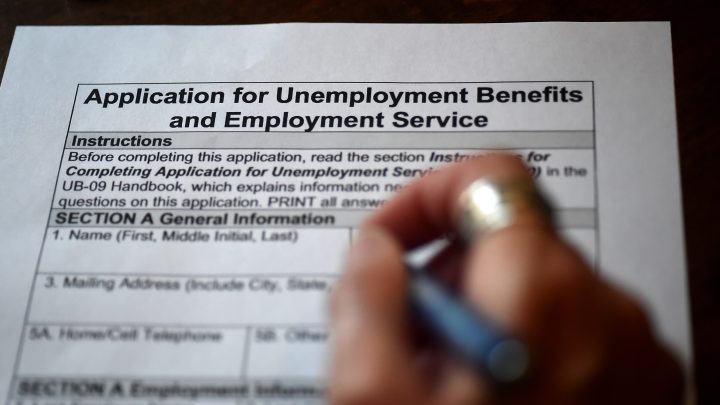
How the loss of $600 a week will impact jobless people we’ve been following
How the loss of $600 a week will impact jobless people we’ve been following

Correction (July 23, 2020): Previous versions of this web and audio story mischaracterized Don Darue’s employment status at 101.5 FM Truckee Tahoe Radio and included a misstatement about company employment decisions. They have been corrected.
If federal pandemic money goes away, the average unemployment check nationwide will drop more than 60%, to about $340 a week.
Don Darue and his family have been getting ready.
“We’ve been saving money in anticipation of the bottom falling out of all of this,” he said. Still, they’re facing a financial cliff.
“We were just talking about that this morning over breakfast — what are we going to do?” he said.
In pre-COVID times, Darue could be found most weekdays hosting morning drive-time radio in Truckee, California, a resort area near Lake Tahoe. When the state issued its stay-at-home order in March, the owner of his radio station, 101.5 FM Truckee Tahoe Radio, kept going into the office while all the other employees worked from home.
“We have worked tirelessly to keep our people employed and paid during this pandemic,” Merri Broglio, marketing manager for the station, told Marketplace.
But Darue had already been on leave since February, and after lockdown started, he stayed home to take care of his two elementary school-age kids, who were home from school. His wife still works supervising food services at a local hospital.
He’s been getting around $400 a week in state unemployment benefits, plus $600 a week federal — it’s actually a bit more than he was making at the radio station.
“Which helped things stay pretty status quo in our house,” he said.
However, Darue still doesn’t know if school’s reopening in the fall. If it doesn’t, he’ll be at home watching the kids.
“If I can’t go back to work, and the COVID relief ends, we are going to have to move. It seems counterintuitive, but during the pandemic, rents have gone up,” he said.
Jody Solell knows what his family’s going to do if the $600-a-week pandemic payment goes away: more of the same.
“We’re pretty frugal,” he said.
Back in March, Solell was furloughed from his job at a solar-energy installer in suburban Maryland.
“I mean, I cut back as soon as I got furloughed. I haven’t been in a store other than a grocery store since March,” he said. “Our credit card bill is like half of what it normally is.”
The loss of federal unemployment payments might force him to start charging the cards up again. Starting next week, Solell’s unemployment check will be reduced by two-thirds, to just $300 a week.
There’s a lot happening in the world. Through it all, Marketplace is here for you.
You rely on Marketplace to break down the world’s events and tell you how it affects you in a fact-based, approachable way. We rely on your financial support to keep making that possible.
Your donation today powers the independent journalism that you rely on. For just $5/month, you can help sustain Marketplace so we can keep reporting on the things that matter to you.












